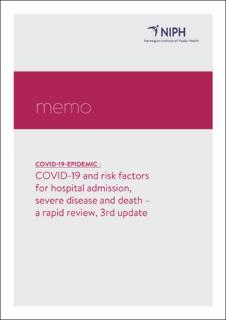COVID-19 and risk factors for hospital admission, severe disease and death – a rapid review, 3rd update
Himmels, Jan Peter William; Borge, Tiril Cecilie; Brurberg, Kjetil Gundro; Gravningen, Kirsten Midttun; Feruglio, Siri Laura; Berild, Jacob Dag
Research report
Published version
Permanent lenke
https://hdl.handle.net/11250/2688547Utgivelsesdato
2020Metadata
Vis full innførselSamlinger
Sammendrag
Key messages
This rapid review is an update of a version published on May 12th, 2020. In this review, only peer-reviewed population-based studies with more than 5000 laboratory test positive cases are included.
The findings are based on searches in MEDLINE and Embase on October 27th, 2020. One researcher screened the search results, and two researchers selected studies for inclusion and synthesised the results. Experts in the field assisted with study inclusion and provided helpful input during the review process. In the current situation, there remains an urgent need for identifying the most important evidence quickly. Hence, we opted for this rapid approach despite an inherent risk of overlooking key evidence or making misguided judgements.
We included five studies that reported results from multivariate analyses of demographic and medical risk factors. We excluded risk factors that constituted laboratory findings, vital signs or symptoms of COVID-19. Two studies were from England, one from the UK, one from the USA and one study was from Denmark. Three out of five studies reported only data on the adult population.
Meta-analysis was not feasible, and the main results of this rapid review are therefore presented in tabular and narratively. Risk factors associated with (i) hospitalisation, (ii) severe/critical disease, and (iii) death due to COVID-19 are reported separately below. Only two large studies included populations under 18 years, but for this age group the results are not representative as the total number of registered incidents is small. Other population groups, which may not have been captured by the included studies will also require further research.
Risk factors for hospitalisation due to COVID-19
Three studies assessed risk factors for hospitalisation due to COVID-19. Overall, age, comorbidities and severity of disease were found to be strong predictors of hospital admission. All three studies provided a granular overview of adjusted hazard ratios (HRs)/odds ratios (ORs) for a broad selection of comorbidities, conditions and ongoing treatments. Most of these were associated with a greater risk for admission, with apparent increases in risk based on severity of condition. Two studies showed a clear dose response relationship between increasing age and hospital admission. Two studies reported an increased risk for hospital admission in adult males. Two studies reported an increased risk of hospital admission with increasing body mass index (BMI) and the majority of assessed ethnicities compared to whites. One study reported increasing risk by number of co-existing comorbidities and severe kidney disease, diabetes type I, ongoing chemotherapy, severe immunodeficiency, heart failure and Down syndrome stand out with a greater associated risk of admission (OR/HR >=3).
Risk factors for developing more severe or critical COVID-19 (ICU treatment)
Two studies assessed risk factors for ICU admissions due to COVID-19, but information on ICU admission alone was only provided by a single study with descriptive information. We therefore included severe illness in this outcome group, as another study defined this as a composite measure including ICU admissions. Overall, age was found to be the strongest predictor of severe COVID-19, with a dose response relationship between increasing age and increased risk. Furthermore, male sex, morbid obesity (BMI>40), heart failure and diabetes was associated with increased risk for severe COVID-19. Being of African American decent was associated with decreased risk.
Risk factors for death due to COVID-19
Four studies assessed risk factors for death due to COVID-19. All studies provided a granular overview of predicting factors. Overall, increasing age was found to be the strongest predictor of death due to COVID-19. Furthermore, male sex, number of and severity of most comorbidities were found to be significant predictors of COVID-19-related death. Ethnicity other than white was consistently associated with modest but increased risk of death, with Blacks having the highest risk of death. Two studies found increasing risk of death with increasing degree of deprivation. Kidney disease, diabetes mellitus type I and II, dementia, ongoing chemotherapy, organ transplant patients, severe immunodeficiency, major psychiatric disorder with antipsychotics, cerebral palsy and Down syndrome (one study) were reported as the strongest predictors of COVID-19 related death (OR/HR >=3). Most singular comorbidities were associated with an increased risk of death.
Conclusion
Based on the data at hand, the elderly are clearly the main group at risk of hospital admission, severe illness, and death if infected by COVID-19. Most comorbidities appear to increase risk. An increasing number and severity of comorbidities contribute to a further increase in the overall risk. Male sex, obesity, non-white ethnicity and deprivation are also associated with increased risk.
